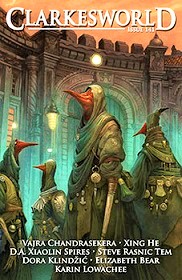“A Space of One’s Own” by Steve Rasnic Tem
Reviewed by Jason McGregor
This issue of Clarkesworld includes three novelettes (one approaching novella length) and two short stories (one approaching flash brevity). They feature robots (with or without AI), magic aliens and post-humans, and surrealism. While this issue is not wall-to-wall depression and dystopia, only one of the stories comes close to being light on its feet. Or foot.
“A Space of One’s Own” by Steve Rasnic Tem
Cedric lives in a dehumanized world of crushing overpopulation in which the buildings that house the people are constantly being morphed into ever-smaller configurations. Each night he has escapist dreams and each day there is only one way out.
This is a surreal tale but, alas, also a dull tale with little action or other points of interest and even its gimmick of magically morphing buildings seems specifically derivative of some other story I can’t put my finger on.
“Vault” by D. A. Xiaolin Spires
On an inhospitable world, Chenguang and Lukas are “cartologist runners” who seem to run and jump and expend energy in order to soak up more sun to get more power for their suits than they would otherwise have while they map out an area for other energy devices to be deployed. If this doesn’t make a lot of sense, don’t worry about it because it doesn’t really have anything to do with the story, which changes when they run into a magic zone of “pulls” which encourage them to step into special places where they learn new things. And if that doesn’t make much sense, don’t worry about that, either. The essence of it all is that the planet’s dry and water’s good.
A second, very dull tale with lines like “No, not abandoned, simply derelict,” “Their leaps, vaults, and tumbles are more cautioned in the dead of the dark and they make gradual progress towards the roof.” And “The return of light graces them with their characteristic fearlessness to pick up speed as they spring and leap back to their tents.”
“The Cosmonaut’s Caretaker” by Dora Klindžić
Arkady, Oksana, and Lazar form the crew of a patrol vessel (with Alcubierre warp drive) since Arkady was wounded in a recent war and left with only one leg and unfit for combat. The crew is augmented by an AI forced on Arkady by the ISC. The ISC is a Euro-American organization that basically rules his Pan-Slavic Union when their effort to develop military AI didn’t go so well. Thus AI is not well-regarded by Arkady and his people. After the other two spend time getting adjusted to ArCa (ARtificial CAretaker Unit) and Arkady spends time avoiding it, the main plot kicks in when they spot a giant ship in forbidden territory and move to intercept it. The leaders of the vessel and their objective come as a surprise and a thorny problem for Arkady which grows even more so when some ne’er-do-wells from the Indo-Chinese Sol Alliance arrive.
This is a nicely sketched milieu (if over-elaborate in retrospect), the characters are swiftly and deftly drawn, the prose is vigorous and effective, and the dilemmas (Arkady and ArCa; Arkady and the other ship) are interesting. Everything was go for an excellent adventure. Alas, the “Swiss-army-knife-AI” was made both too convenient and much too sentimental while the climactic plot sequence was insufficiently motivated. It was still a fun ride but could have been vastly improved with some tweaks to the end section.
“Your Multicolored Life” by Xing He
Zhang Hua lives in a world of brutal enslavement by robots. You Ruo lives in a world of luxurious enslavement by robots. Both escape and meet each other and much irony ensues.
The transition between the first two sections is initially unclear. The sentiment of the story changes from a seeming advocacy of revolution to a parable of passivity, though there seems to be some sarcasm in the end. Either way, its construction as a fable was too overt though the surface character and action could have served a more literal story well.
“Heron of Earth” by Vajra Chandrasekera
A Heron by any other name (sometimes calling its selves, splintered from a posthuman donor, various bird-like things) is wandering around, telling us about a posthuman faction devoted to the “regreening of the earth.”
As short as this tale is (just over two thousand words) it didn’t really hold my interest or register with me. There was a funny bit in which the aesthetics of the Working Group (of the regreening project) is critiqued by the protagonist, though.
More of Jason McGregor’s reviews can be found at Featured Futures.
 Clarkesworld #141, June 2018
Clarkesworld #141, June 2018